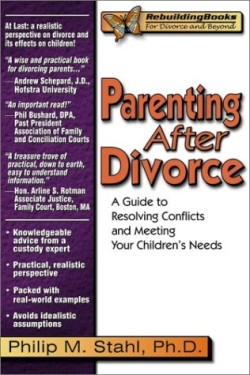
Parenting After Divorce
A Guide to Resolving Conflicts and Meeting Your Children's Needs
“Your divorce doesn’t have to damage your children,” writes the author in this practical guide for divorced parents. Every year in the United States more than one million children see their parents divorce. Here, in straightforward, almost simplistic language, Stahl offers parents the advice and strategies gleaned from twenty years as a psychologist, therapist, and custody evaluator working with children and families of divorce.
Some of his advice ranges from the common-sensical—“Avoid conflict in front of your kids”—to the speculative: “Take him (your son) on hikes, bicycle trips or camping. Consider yourself the ‘outdoor fun’ parent.”
In general, though, Stahl offers pragmatic, intelligent suggestions for resolving the thorny issues that inevitably arise during the breakup of a family. The book includes sections on parenting alone, coping with extremely difficult spouses, reducing competition between parents, and working within the court system. Particularly helpful is the section on resolving scheduling conflicts, an unavoidable problem in nearly every joint-custody situation. Stahl includes a sample schedule calendar.
Another especially useful section is a chapter on how divorce affects children of various ages, from very young infants all the way through the late teen years. The chapter includes several pages of questions children might ask along with healthy, tactful suggested answers. The language for some of these answers seems stilted, but the ideas behind them are sound. To the question “Why do I have to go over to Dad’s? I don’t like him,” Stahl proposes this response: “I think we need to talk about all of your feelings.
What’s the problem at Dad’s? Can you talk with him about any of this? You know, lots of times we don’t like some things about someone, but then we find a way to work it out. Relationships aren’t always easy, even with people we’re close to.“
At times, Parenting After Divorce has the feel of an extended version of “Everything I Need To Know I Learned in Kindergarten”—play nice, share, don’t fight. There is no bad advice here, however, and if all parents would follow Stahl’s blueprint as they split up, divorce would be far easier on many children. The central premise of his book—that parents’ top priority during a divorce should be to minimize the pain for their children—is inarguable.
Reviewed by
Amorak Huey
Disclosure: This article is not an endorsement, but a review. The publisher of this book provided free copies of the book to have their book reviewed by a professional reviewer. No fee was paid by the publisher for this review. Foreword Reviews only recommends books that we love. Foreword Magazine, Inc. is disclosing this in accordance with the Federal Trade Commission’s 16 CFR, Part 255.
